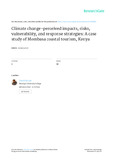| dc.contributor.author | Njoroge, Joseph M. | |
| dc.date.accessioned | 2016-09-28T16:10:49Z | |
| dc.date.available | 2016-09-28T16:10:49Z | |
| dc.date.issued | 2015 | |
| dc.identifier.uri | http://hdl.handle.net/123456789/101 | |
| dc.identifier.uri | http://www.academia.edu/11255701/Climate_change-_perceived_impacts_risks_vulnerability_and_response_strategies_A_case_study_of_Mombasa_coastal_tourism_Kenya | |
| dc.identifier.uri | https://www.researchgate.net/publication/273085098_Climate_change perceived_impacts_risks_vulnerability_and_response_strategies_A_case_study_of_Mombasa_coastal_tourism_Kenya | |
| dc.identifier.uri | https://www.academia.edu/11255701/Climate_change-_perceived_impacts_risks_vulnerability_and_response_strategies_A_case_study_of_Mombasa_coastal_tourism_Kenya | |
| dc.description.abstract | Climate change policies are advancing, at least rhetorically. These policies are made through complex
processes of interactions among stakeholders whose opinions are shaped by historical experiences,
beliefs, awareness and understanding of potential climate impacts coupled with information received
from third parties, both formal and informal. However, it has been argued that tourism stakeholders’
actions in response to climate change will depend on their supply-side perceived vulnerability.
Interviews were used to study tourism stakeholders’ past account of environmental hazards,
perception potential impacts of climate change and their response strategies for coastal tourism
region of Mombasa, Kenya. Findings indicate categorical awareness variation with government
officials, conservation and research institutes being more aware of climate change potential impacts
whereas tourism managers were found to have global picture of the phenomena rather than local
picture of the occurrence of climate change impacts despite having experienced challenges of water
scarcity, coral reef bleaching, changes in precipitation, flooding, and changes in beach structure which
all have implication for tourism. No tangible adaptation actions are reported among tourism operators,
but the government is engaging on planed adaptation. Information sharing, education and actor–
partnerships among the players at the destination are proposed and further research gaps are
outlined. | en_US |
| dc.title | Climate change-perceived impacts, risks, vulnerability, and response strategies: A case study of Mombasa coastal tourism, Kenya | en_US |

